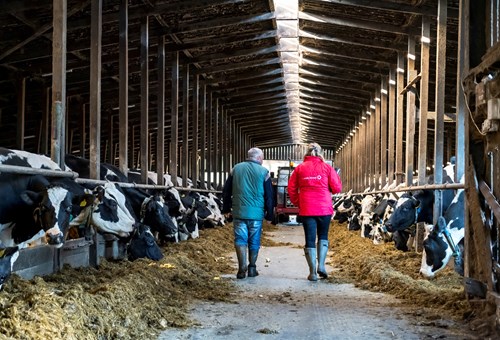Common farm health and safety risks
Approximately 10 people a week are injured working in agriculture. Livestock and farm vehicles are common causes of the many farm accidents resulting in death and serious injury.

Farm health and safety: what to consider
Farm accidents have far-reaching effects on all those involved and a financial impact on the farming business. A safe working environment is a fundamental requirement and we are here to help you make sure it’s a central part of your farm management and long-term business resilience.
The farming health and safety regulations you need to know
As a business owner, you have legal obligations around farm health and safety to safeguard yourself and the welfare of your family, employees and the public.
UK law states every business must have a policy for managing health and safety, and if you have five or more employees, this policy must be written down. The following areas form the basis of a farm health and safety policy.
Risk assessments are a legal requirement for all UK businesses. They are the starting point for protecting everyone from harm and the foundation of a positive health and safety culture.
Work equipment inspections are compulsory within health and safety regulations. All equipment must be suitable for designed purpose, free from defects and inspected regularly. For specialist equipment, inspections may need to be completed by a qualified inspector or engineer, eg. LOLER (Lifting Operations and Lifting Equipment Regulations 1998) for heavy lifting equipment.
Incident reporting is essential for all events involving injury, either for your own purposes and records or to be sent to the Health & Safety Executive (HSE). In the event of a claim against you, an incident report form can be used as evidence and presented in court. In some circumstances, the HSE requires a RIDDOR (Reporting of Injuries, Diseases and Dangerous Occurrences Regulations 2013) report.
Employee training is a legal duty to ensure staff are adequately trained to carry out their roles safely, including use of equipment. Training records are also essential and in the event of an injury, you can be asked to provide evidence of training months or even years after it has taken place.
Measures to manage health and safety on farms
Health and safety regulations are just one of the many demands you face running a modern farm. Cornish Mutual is determined to make your life easier and safer by using our farm health and safety advisors to help you improve farm safety.
Our specialist in-house health and safety team provide tailored, practical support on an on-going basis to help you put a farm health and safety system in place and meet legal requirements. This safeguards you, your family, employees and your business, allowing you to rest assured your farm is as safe as it can be.

Our farm Health and Safety Service provides
- Full farm health and safety audit with a detailed risk assessment and easy-to-use action plan tailored to your specific business, including an annual review and updates
- Regular visits from our farm health and safety experts as and when required, providing hands-on advice, assistance and the answers you need, whenever you need them
- Comprehensive documentation including policies & procedures, COSHH, asbestos, competent contractors, employee safety, machinery and equipment records, inspection checklists, electrical inspections and emergency plans
- Regular updates on new or changing HSE legislation helping you stay informed and compliant
- Direct support and guidance on reporting incidents, including injuries and other RIDDOR incidents to the HSE on your behalf
To find out more about our Farm Health and Safety Service, email lossprevention@cornishmutual.co.uk, call 01872 277151 or speak to your local Field Advisor.


